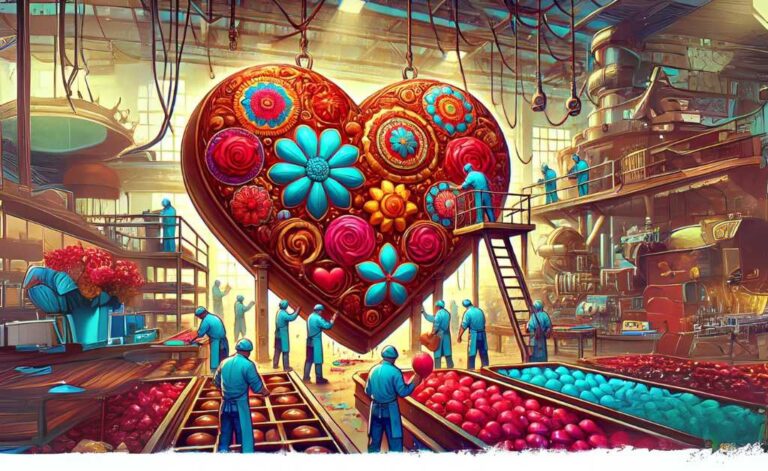Why Love Fades: The Science Behind Long-Term Relationships
Why Love Fades: The Science Behind Long-Term Relationships
Introduction: Why Does Love Change Over Time? 🧠💔
Love starts with passion, excitement, and deep emotional connection. But over time, many relationships experience a decline in passion or even emotional distance. Why does this happen? Is love destined to fade, or can it be sustained?
In this article, we’ll explore: ✔ The biological changes that affect long-term love ✔ How dopamine, oxytocin, and serotonin influence relationship dynamics ✔ The psychological and emotional reasons love fades ✔ Ways to rekindle passion and connection in long-term relationships
Let’s break down the science behind why love fades—and what you can do about it! 💡❤️
1. The Biology of Fading Love: How Brain Chemistry Changes Over Time 🔬
The same brain chemicals that make us fall in love are also responsible for why passion often declines.
How Neurotransmitters Influence Love
🧪 Dopamine → The “pleasure chemical” fuels attraction and obsession but naturally declines over time. 🧪 Oxytocin → The “bonding hormone” strengthens emotional security but may reduce excitement. 🧪 Serotonin → Stabilizes mood but decreases the obsessive excitement of early love. 🧪 Vasopressin → Increases commitment but can also reduce novelty-seeking behavior.
🔍 Key Research Findings:
- Early-stage love activates dopamine pathways, creating feelings of obsession and excitement (Fisher et al., 2005).
- Over time, the brain shifts to oxytocin-driven bonding, reducing the intensity of early passion (Acevedo et al., 2011).
- Couples in long-term relationships experience less dopamine activation when seeing their partner, compared to new lovers.
📌 Expert Insight: “Romantic love transitions from dopamine-driven passion to oxytocin-driven stability, which is why excitement fades but emotional security grows.” — Dr. Helen Fisher, Biological Anthropologist
💡 Real-World Tip: ✔ Novel experiences boost dopamine! Plan new activities, surprise your partner, or try something adventurous together.
🔍 Further Reading: Harvard Medical School – The Science of Love
2. The Psychology of Love Fading: Emotional & Relationship Patterns 🧠💬
Beyond biology, psychological factors play a huge role in why relationships change.
Common Psychological Factors That Cause Love to Fade
🔹 Habituation → The brain gets used to repeated stimuli, making once-exciting experiences feel routine. 🔹 Unrealistic Expectations → Passionate love is often idealized, but real relationships require effort. 🔹 Neglecting Emotional Connection → Focusing on external responsibilities (work, kids, stress) can reduce intimacy. 🔹 Poor Communication → Conflict avoidance or lack of deep conversations can weaken bonds.
📌 Expert Insight: “People often confuse passion with love. Real love is a choice and effort, not just a feeling.” — Dr. John Gottman, Relationship Expert
💡 Real-World Tip: ✔ Prioritize emotional intimacy—set aside time for deep, meaningful conversations with your partner.
🔍 Further Reading: APA – The Psychology of Love & Relationships
3. Relationship Dynamics: Why Couples Drift Apart 💔
Certain relationship patterns predict long-term dissatisfaction or breakup.
Top Reasons Couples Grow Apart
🔻 Lack of Quality Time → Busy schedules reduce meaningful connection. 🔻 Emotional Disconnection → Partners stop sharing feelings, leading to loneliness. 🔻 Neglecting Physical Affection → Oxytocin levels drop when physical touch declines. 🔻 Unresolved Conflicts → Accumulated resentment weakens emotional bonds.
📌 Expert Insight: “Happy couples continuously invest in their relationship, just like maintaining a healthy lifestyle.” — Dr. Sue Johnson, Clinical Psychologist
💡 Real-World Tip: ✔ Regular date nights and shared activities keep emotional and physical intimacy alive.
🔍 Further Reading: Stanford University – The Science of Relationship Success
4. How to Prevent Love from Fading: Science-Backed Solutions 🔥
The good news? You CAN sustain love by making intentional efforts to strengthen your connection.
Ways to Keep Love Strong Over Time
✔ Keep Trying New Things Together → Novel experiences trigger dopamine, making the relationship exciting. ✔ Express Gratitude Daily → Acknowledging small acts of kindness boosts emotional intimacy. ✔ Maintain Physical Touch → Hugs, kisses, and hand-holding release oxytocin and strengthen bonding. ✔ Improve Communication → Honest conversations about feelings and needs prevent emotional distance. ✔ Show Appreciation & Affection → Small, consistent efforts make a big impact on relationship satisfaction.
📌 Expert Insight: “Long-term love requires intentional acts of connection, not just waiting for passion to return.” — Dr. Esther Perel, Relationship Therapist
💡 Real-World Tip: ✔ Think of love as a “relationship bank account”—small daily deposits (kind words, affection, appreciation) keep it thriving.
🔍 Further Reading: National Institute of Health – How Love Evolves
Frequently Asked Questions (FAQs) About Love & Relationship Longevity ❓
1. Is it normal for passion to fade in long-term relationships?
Yes! Passion naturally shifts from dopamine-driven excitement to oxytocin-driven bonding, but couples can revive passion with effort.
2. Can love last forever?
Yes, but it requires active maintenance—strong communication, shared experiences, and ongoing appreciation.
3. Why do some couples stay in love while others don’t?
Happy couples prioritize connection through communication, novelty, and emotional support.
4. Does having children impact romantic love?
Yes, parenthood shifts priorities, but intentional intimacy efforts can keep passion alive.
5. What’s the best way to rekindle love in a long-term relationship?
Try new experiences, prioritize physical affection, and engage in deep emotional conversations.
Final Takeaways: Why Love Fades & How to Keep It Alive 💖🧠
✔ Passion naturally declines over time, but emotional intimacy can grow stronger. ✔ Neurotransmitters like dopamine, oxytocin, and serotonin influence long-term love. ✔ Couples who prioritize novelty, communication, and affection maintain lasting love. ✔ Love requires effort, just like health and personal growth—it doesn’t survive on autopilot.
💡 Final Thought: Love isn’t something that “just happens”—it’s something we create and sustain. By understanding the science of love, we can build deeper, more meaningful relationships that stand the test of time. ❤️
📚 Further Reading & External Sources:







